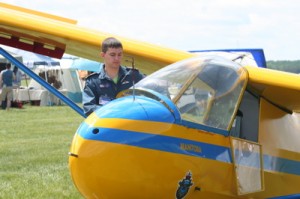By Rachel Ward
The former deputy commander of Nova Scotia’s cadet gliding school has gone to court – and lost – arguing he was pushed out of a job as part of “three years of procedural wrongdoing.”

John MacLellan had been working at the Regional Gliding School Atlantic in Debert for 25 years when he got a new, younger boss, Lieutenant Colonel David Lewis. Clashes with Lewis would lead to a court battle that culminated in last month’s court decision.
In January 2010 for the first time in 25 years, MacLellan’s job was posted to competition. Lewis had changed his job’s requirements, adding new technical skills MacLellan had never before needed.
Unable to apply, MacLellan lost his old position, and Captain Curtis Cooper, a man 17 years his junior, was hired. Now unemployed, MacLellan considered leaving the military, but instead enlistede Kevin MacDonald’s legal help.
The two met almost 40 years ago, when MacDonald was hitchhiking to an airshow in Sydney Mines. MacLellan, then an air cadet leader, picked him up, wondering why a teenage kid would be out so early in the morning, alone on the highway.
MacLellan went on to teach at Debert, and in 1985, was hired as deputy commander, directing cadets. Learning to fly, “changes their lives forever,” said MacDonald, a former cadet himself and now a volunteer with the 73-year-old organization. “They come back, biggest smile on their face.”
According to court documents, MacLellan says he was told by his boss that he would always keep that job if he did it acceptably. As the years progressed, that promise held true, and the job contracts got longer – first for three years, then for six. Those short contracts turned into a quarter century.
Then started what the two believe was a “nefarious plot” to get rid of MacLellan. Most recently, they appeared in front of the Supreme Court of Nova Scotia, defending this idea. To support their application, two other former Debert staff members offered to testify about their earlier claims that sparked an internal investigation by the military into the camp’s hiring practices.
“Those are not everyday allegations,” said Ronald Pizzo, a labour lawyer who analysed documents from both court cases.

The civilian case that ended this July proved difficult, though it took place in court room more familiar to MacDonald, who’s trained in civil – not military – law.
“They didn’t get very far, did they?” said Pizzo.
Court battles begin
In March 2010 MacDonald, now his lawyer, wrote a letter to region’s commander. As a result, the job change was investigated, according to the civil suit decision, and found MacLellan had not been treated in “a fair and equitable manner.”
MacLellan than accepted an offer of a three-year contract for a more junior position, as the officer in charge of flight safety.
Court documents says tension was building between MacLellan and Lewis over the coming months. On July 24th, 2010, Lewis “verbally assaulted” him in front of junior staff, according to MacLellan’s affidavit. Jason Dawe, then a flight instructor, was in the room.
“I saw the argument,” said Dawe in an interview, “even though I tried to run away from what was happening.”
MacLellan reported the incident, and was later told they would hold mediation. Shortly after, a different story emerged.
Lewis pressed charges, three counts of insubordination, one for each swear word uttered by MacLellan. The court martial would find MacLellan not guilty, with the judge noting that Lewis’s choice of a court martial over mediation was “somewhat unusual, but certainly not abusive.”
Chronology
View this partial timeline for a better picture of when events happened:
MacDonald says, according to court documents, he was denied resources normally provided by Defense Counsel Services. Instead, MacDonald volunteered his time to the case.
MacDonald says this has caused stress, as MacLellan still owes money for witnesses’ travel expenses to testify at the court martial and had little to spend on extra research support.
“How can you fight with a hand tied behind your back?”
Other actions by higher-ups raised flags for MacDonald. For example, Captain Darren Garnier, the Chief of Staff for Maritime Forces Atlantic, called MacLellan into his office prior to the court martial. Garnier tried, court documents argue, to persuade MacLellan to pursue a court martial where he would simply plead guilty. MacLellan, instead, wanted to be represented and fight the charges.
“I had the distinct impression then and since that they simply wanted me to admit that I had done something wrong and ‘take my punishment’ – when I had not,” reads MacLellan’s affidavit. Garnier was named as a defendant in a later overturned civil action.
The court martial went back and forth between MacLellan’s side alleging abuse of process, and Lewis’s side rejecting that. The Crown called one witness, Lewis. MacLellan then had to pay to fly in several witnesses, including Dawe, who says he “flew up as cheap as” he could. In the end, the judge, Lieutenant-Colonel M.J. d’Auteuil, found MacLellan not guilty, and acquitted him of all charges.
The judge also found no evidence that Lewis had any “involvement in those proceedings then being the complainant. He was never in a position to influence or to direct people on how to do things.”
Challenge of a mistrial
Had the judge found it to be a mistrial, as MacDonald argued, the Crown could have appealed, and the charges tried again. A mistrial is hard to prove, says Ron Pizzo, a labour lawyer in Halifax.
Even harder was going to court in July, trying to prove the whole thing was a conspiracy – or at least mishandled.
“Any time your job security is put at risk, it feels like a personal attack,” said Pizzo. Perhaps, says Pizzo, more could have been done to smooth the transition originally, and give MacLellan the opportunity to catch up to the new standards.
MacLellan took medical leave due to his mental health, and then retired mid-August, 2011.
MacLellan now lives in a white house in Shubenacadie, East Hants County, a little less than an hour’s drive from the airfield he used to frequent. He turned down an interview through his lawyer.
Lewis could not be reached, nor could his lawyers.
MacDonald says he will appeal the decision.
“That’s not the gliding school. That’s not the military I know.”
Read the Nova Scotia Supreme Court decision:
